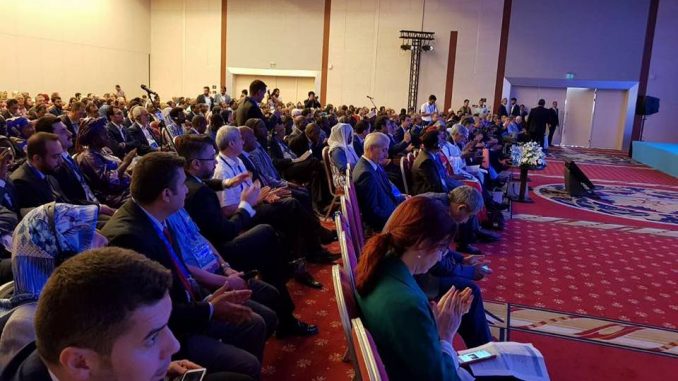
*SIERRA LEONE’S DEPUTY HEALTH MINISTER II EXCELS IN ISTANBUL, TURKEY AT THE 34TH FIMA SCIENTIFIC CONGRESS ON HEALTH IN AFRICA.*
*Sierra Leone’s Deputy Minister of Health and Sanitation II, Hon. Zulianatu Cooper* as a Policy Leader and a key player in the Health Care Delivery System delivered an outstanding statement in *Istanbul, Turkey at the official opening session of the 34th FIMA Scientific Congress on the theme “Key Health Challenges in Africa: Epidemics and History of Epidemics”* withbemphases on Sierra Leone in particular and Africa as a continent.
According to the Deputy Minister of Health and Sanitation II, Hon. Zulianatu Cooper, she highlighted the changing trend in the occurrence of epidemics from the 19th to the 20th century.
“Epidemics normally affect poor populations who are the most vulnerable in any country resulting in death if not managed well. The communities are affected socially and economically. The disparities in technology, skilled manpower and adequate service provision during epidemics have resulted in the effective management of epidemics. Epidemic Diseases can be categorized in the same way as famines, war or natural disasters as they result in social and economic hardships. Disease epidemics result in substantial ill health and loss of lives and therefore pose a threat to global health security, undermine socioeconomic lives and destabilize societies” she explains.
Going further, she gave a general update on the HIV/AIDS situation as Africa has been faced with one of the most devastating conditions HIV/AIDS, which has resulted in tragic social and economic consequences as well as adversely affecting the delivery of health systems and this scourge has been ongoing for years and it cannot be ignored as it continues to claim lives.
On the impact of Ebola Virus Disease (EVD), the Deputy Minister of Health and Sanitation informed the participants that the recent Ebola virus disease (EVD) outbreak in West Africa and its consequences is a reminder of the global threat of epidemics as the outbreak began in Guinea in December 2013 and rapidly spread to Liberia in March 2014 and Sierra Leone May 2014 as a result of imported infections from Guinea all three countries suffered a full blown epidemic was recorded and was completely different from the known trends of the disease and other small outbreaks also occurred in Nigeria and Mali and imported cases were reported in Senegal and even outside Africa in the USA, the United Kingdom and other parts of the world.
“In the three main affected countries, over 28,000 people have become infected and 11,000 lives have were lost and the economic losses as a result of the Ebola epidemic were estimated to be up to 2.2 billion US by the World Bank” She affirmed.
In her closing, she gave a comprehensive summary on Yellow fever and cholera in Sierra Leone in particular and Africa as a continent.
Other speakers made brilliant contributions relating to Health Challenges in Africa and the Way Forward, Modernization, Globalization and Health in the African Context, Africa and Humanitarian and Healthcare Aid, Africa and Humanitarian and Healthcare Aid, Health Education in Africa, The Organization of Health in Africa and Turkey-Africa cooperation





